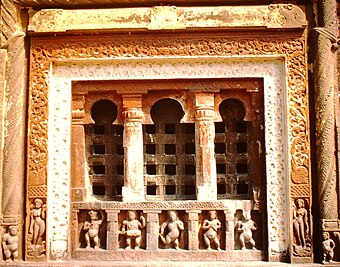Gana (mythology)

The term Gana comes from Sanskrit ( Devanagari : गण; German about 'group', 'horde', 'troop' or 'crowd') and describes the dwarfish and potbellied accompanying crowd of the god Shiva . Its leader is the elephant-headed and pot- bellied god Ganesha , who is also known as gaṇa-īśa or gaṇa-pati , which means something like 'Lord of the Ganas'.
The Ganas' preferred whereabouts are remote, hidden places such as caves or even repulsive and unclean places such as cremation sites. They are also associated with ancient tree or forest deities ( yakshas ).
history
The Sanskrit word gana appears in the ancient Indian Vedas and describes a gathering of warriors under their leader ganadhipati , which much later became Ganapati , ie Ganesha. The uncanny and irrepressible figures of the early days, sometimes described as multi-headed, gradually became deities of lower rank, who only had to perform serving or accompanying, i.e. entertaining tasks during the development of the Indian high gods ( Brahma , Shiva and Vishnu ).
Representations
Since the beginnings of Hindu sculpture in the 5th century, ganas have been depicted as two-armed, droll figures making music or dancing. In the early days they are often found as companions of Shiva or at Shiva temples. They also appear in guard-like functions on portals or as atlases . In the course of time, however, they fade more and more into the background and almost completely disappear from the sculptors' repertoire in the Indian High Middle Ages .
Dancing Gana at the Dashavatara Temple , in Deogarh , Uttar Pradesh (around 500)
Shiva accompanied by several ganas (ol), relief of the descent of the Ganga , Mamallapuram , Tamil Nadu (around 700)
four-armed gana making music in the Shiva temple of Bhojpur , Madhya Pradesh (around 1050)
Others
In ancient Buddhist texts, the term gana can be found in the sense of 'monk community' or 'monk assembly' ( shanga ). These are often seen as the beginnings of democratic traditions in India.
See also
The goat-legged satyrs were originally wild and untamed nature deities, from which the flute-playing and dancing accompanying group of the Greek Dionysus and the Roman Bacchus later emerged.
Web links
- Ganas - Heavenly Hooligans (English)


